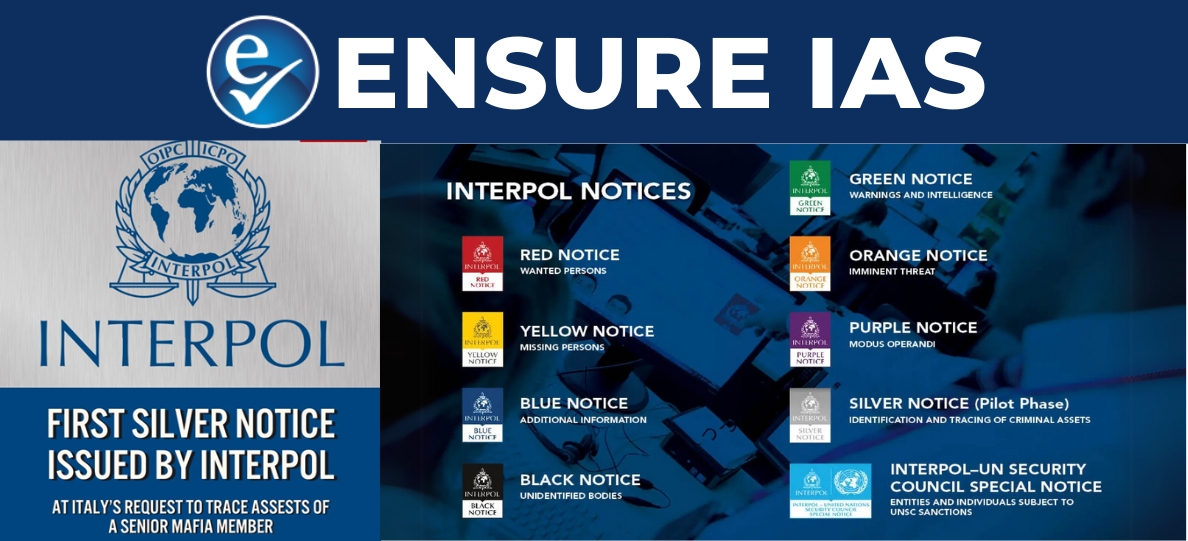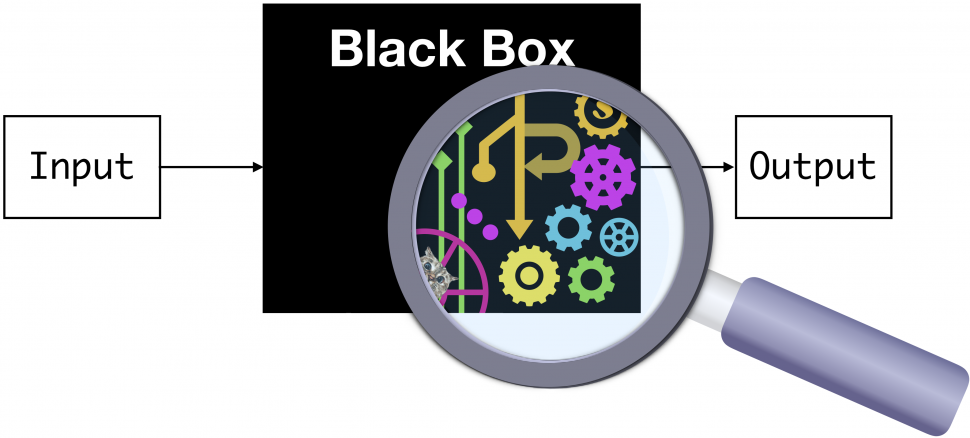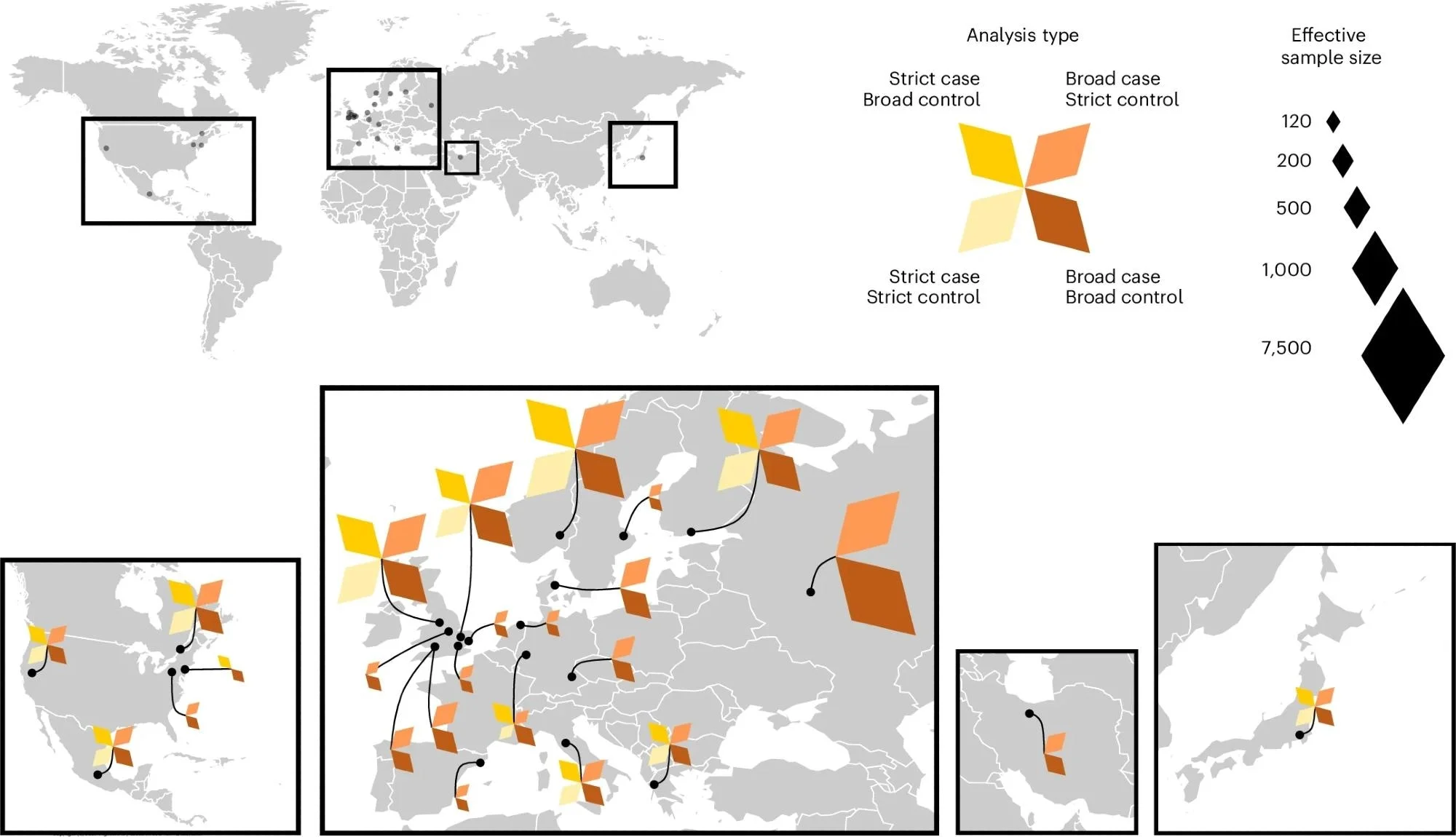- Courses
- GS Full Course 1 Year
- GS Full Course 2 Year
- GS Full Course 3 Year
- GS Full Course Till Selection
- Answer Alpha: Mains 2025 Mentorship
- MEP (Mains Enrichment Programme) Data, Facts
- Essay Target – 150+ Marks
- Online Program
- GS Recorded Course
- Polity
- Geography
- Economy
- Ancient, Medieval and Art & Culture AMAC
- Modern India, Post Independence & World History
- Environment
- Governance
- Science & Technology
- International Relations and Internal Security
- Disaster Management
- Ethics
- NCERT Current Affairs
- Indian Society and Social Issue
- NCERT- Science and Technology
- NCERT - Geography
- NCERT - Ancient History
- NCERT- World History
- NCERT Modern History
- CSAT
- 5 LAYERED ARJUNA Mentorship
- Public Administration Optional
- ABOUT US
- OUR TOPPERS
- TEST SERIES
- FREE STUDY MATERIAL
- VIDEOS
- CONTACT US
Interpol Issues 1st Silver Notice to Trace Illicit Wealth Laundered Across Borders
Interpol Issues 1st Silver Notice to Trace Illicit Wealth Laundered Across Borders
13-01-2025

- In January 2025, Interpol, the global policing organization, took a significant step in fighting international money laundering by issuing its first-ever Silver Notice.
- This new notice is aimed at tracing illicit assets that have been moved across borders, targeting the wealth of criminals involved in serious offenses like corruption, fraud, and drug trafficking.
- The initiative is part of a pilot project involving 52 countries, including India, and aims to assist in locating and recovering the hidden assets of criminals.
What is Interpol?
- Full Name: International Criminal Police Organisation
- INTERPOL was officially created in 1923, the idea was born at the first International Criminal Police Congress held in Monaco in April 1914.
- Membership: Interpol has 196 member countries.
- Role: Interpol facilitates international cooperation among police forces by sharing crime-related data, providing technical support, and coordinating cross-border investigations.
- Indian Role: In India, the Central Bureau of Investigation (CBI) coordinates with Interpol for international investigations.
What is the Silver Notice?
- Purpose: The Silver Notice is a new tool designed to trace criminal assets that have been illicitly transferred across borders. These assets could include:
- Properties
- Vehicles
- Businesses
- Financial accounts
- Focus: It targets assets hidden in foreign countries, especially in tax havens, and aims to recover these illegal wealth forms.
- Request System: Countries can use the Silver Notice to request information from other nations about criminal assets, and it can lead to formal requests for asset seizure, confiscation, or recovery based on national laws.
First Use of the Silver Notice
- Initial Use: Italy requested the first-ever Silver Notice to trace the hidden assets of a senior mafia member who had illegally transferred wealth abroad.
- Significance: This marks a new chapter in international crime-fighting, highlighting the ability to trace assets that are often hidden in different jurisdictions to evade law enforcement.
Why Is This Important for India?
- India’s Role: As one of the 52 countries participating in the pilot project, India stands to benefit significantly from the Silver Notice.
- Hidden Wealth: Many economic offenders from India are believed to have moved illicit wealth to foreign countries.
- This includes the proceeds of corruption, fraud, and other financial crimes.
- Fugitive Economic Offenders: By using the Silver Notice, India can trace these assets and work towards recovering them, aiding in the prosecution of these offenders and ensuring justice is served.
Pilot Project and Global Cooperation
- Duration: The Silver Notice pilot project is set to run until at least November 2025.
- Request Limit: Countries can make a total of 500 requests during the pilot, with each country receiving an equal share of requests.
- Review Process: Interpol will carefully review each request to avoid misuse for political purposes, ensuring that only legitimate cases are pursued.
- Confidentiality: Information related to the notices remains confidential, preserving the integrity of sensitive data during international investigations.
- Global Objective: The broader goal is to weaken criminal networks by targeting their financial assets, making it more difficult for them to continue illegal activities.
How Does the Silver Notice Work?
- Asset Tracing: Countries can request details about assets connected to criminals involved in serious crimes like:
- Corruption
- Fraud
- Drug trafficking
- Environmental crimes
- Recovery Efforts: The notice helps countries identify where illicit assets are hidden, often in tax havens or foreign jurisdictions.
- Bilateral Cooperation: Countries can collaborate through bilateral agreements to seize or recover these assets, depending on national laws and legal frameworks.
Other Types of Interpol Notices
Interpol uses a system of color-coded notices, each designed for a specific function:
- Red Notice: Requests for the detention of fugitives.
- Yellow Notice: Helps locate missing persons or identify individuals.
- Blue Notice: Gathers more information on a person’s identity or activities.
- Black Notice: Aims to identify unknown bodies.
- Green Notice: Warns about a person’s criminal activities.
- Orange Notice: Alerts about dangerous events or objects.
- Purple Notice: Shares information on criminal methods or operations.
- UN Security Council Special Notice: Targets individuals/entities under UN sanctions.
The Silver Notice fits into this system as a tool for tracing criminal assets, complementing other notices that assist in identifying criminals or securing public safety.
The Bigger Picture: Why the Silver Notice Matters
- Disrupting Criminal Networks: The new notice is part of Interpol’s broader strategy to disrupt organized crime. By targeting the financial gains of criminals, it weakens their operations and ability to carry out illicit activities.
- Asset Recovery: A significant challenge in international crime is the recovery of stolen assets. Currently, about 99% of criminal assets remain unrecovered. The Silver Notice aims to change this by simplifying the process of tracing and recovering illicit wealth.
- Global Impact: The Silver Notice will play a critical role in holding criminals accountable by making it harder for them to hide their ill-gotten wealth in foreign jurisdictions.
Conclusion
Interpol's Silver Notice is a major step forward in international law enforcement, providing a powerful tool to trace and recover illicit assets hidden across borders. The pilot project, which includes 52 countries like India, represents a collaborative effort to fight money laundering and financial crime. As the project progresses, it is expected to enhance international cooperation, disrupt criminal networks, and ensure that criminals cannot escape justice by hiding their wealth abroad.

|
Also Read |
|
| FREE NIOS Books | |



